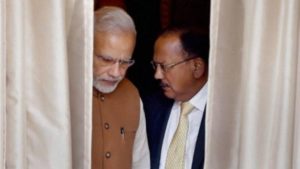He is far more active than his‘advisory role’ would suggest. And his alleged interference in the functioning of central agencies like the CBI deserves an inquiry in the least

The Supreme Court is unlikely to look into the role of the National Security Advisor Ajit Kumar Doval in orchestrating the midnight coup at the Central Bureau of Investigation. But allegations contained in the unheard petition filed by CBI DIG Manish Sinha, deserve a court monitored inquiry, feel several observers who have followed with growing dismay the misadventures of the NSA.
Six years older to Narendra Modi, the PM’s National Security Adviser Ajit Kumar Doval (74) had played a key role in ‘Elect Modi as PM’ campaign and came as no surprise when he was called upon to help build ‘Team Modi’ at the Centre. Doval’s as the NSA and on his suggestion Nripendra Mishra’s as the Principal Secretary to the PM, were the first appointments announced in 2014 by the Modi Government.
Misgivings voiced over his appointment in 2014 have however given way to alarm four and a half years later. There is growing uneasiness over his overt political activism, his penchant for making political statements in public and a growing suspicion that the NSA is not averse to using state power and central agencies to protect the political interests of the ruling party. Unlike his four predecessors, he is too openly aligned with the RSS and the BJP and is seen to be bending over backwards to interfere in political and democratic processes.
Even Brajesh Mishra, India’s first NSA who enjoyed a special rapport with the then Prime Minister, did not eclipse the Home Minister and the Minister of External Affairs as completely as Mr Doval has done. He is credited with driving Modi’s foreign policy and pushing India closer to the United States and Israel. He is said to be responsible for ‘surgical strikes’, boasting of imposing costs on Pakistan and prodding a muscular policy in J & K and defend the use of pellet guns on restive citizens. He has even figured in Law Ministry documents which show that he negotiated the Rafale deal with France.
Not just the security czar, the NSA got the PMO to notify the change of guard at the Central Bureau of Investigation (CBI) past midnight on October 23. It was he who was said to have supervised the midnight coup to ‘depose’ the CBI director
Not just the security czar, the NSA got the PMO to notify the change of guard at the Central Bureau of Investigation (CBI) past midnight on October 23. It was he who was said to have supervised the midnight coup to ‘depose’ the CBI director. Similarly, in June this year when the BJP decided to pull the plug on its coalition with the PDP in J&K, it was the NSA whose hands were seen behind the move even as the Home Minister Rajnath Singh was kept out of the loop. The Government glossed over the NSA’s visits to the official residence of BJP president Amit Shah despite the opposition crying foul and complaining of impropriety.
Nor has the NSA been as discreet in his public utterances as his predecessors. Delivering the Sardar Patel Memorial lecture this year he declared that India could not afford a weak, coalition government for the next 10 years. While this was interpreted as an unwarranted endorsement of majoritarianism, he had earlier also raised eyebrows by declaring that a separate Constitution for Jammu & Kashmir was an aberration even as the Supreme Court is hearing petitions challenging Articles 370 and 35A of the Indian Constitution.
And although the NSA is contemptuous of the media (he is on record saying that media is interesting entertainment for him, that only one per cent of what has appeared in the media about him is true and that media should put national interest above everything else etc.), he is known to be uninhibited in sharing selective documents, information and videos with trusted sections of the media, if the grapevines in Lutyen’s Delhi are to be believed.
Paradoxically, he does not seem as concerned with the spread of fake news and photoshopped videos circulating on WhatsApp. If he is concerned about rising incidence of violence and mob lynching, which one of his predecessors Shivshankar Menon believes pose an existential threat to India, there is not much evidence of it.
source: NH






































